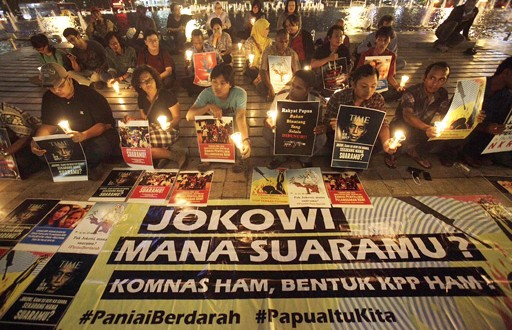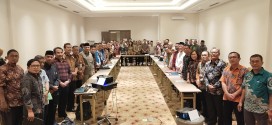The President Joko “Jokowi” Widodo administration has failed to deliver on its campaign promise of human rights protection in its first year, a study has revealed.
The Setara Institute for Democracy and Peace recorded a slight fall of 0.04 points from 2014 to 2015 on the achievement index of human rights promotion, which is rated from 0 to 7, with 7 being the best score.
“The results are not surprising because human rights issues have evidently not been a priority in the Jokowi-JK administration,” said Setara Institute deputy chairman Bonar Tigor Naipospos, referring to Jokowi and Vice President Jusuf Kalla.
According to Bonar, the promise made during the election campaign was not reflected in a number of government documents, including the National Mid-Term Development Plan (RPJMN), the National Plan of Action on Human Rights (RANHAM) and the Government Working Plan (RKP).
The study, which was conducted from Nov. 5 to Dec. 5, involved 215 respondents in 19 provinces.
Setara research director Ismail Hasani said that respondents, who consisted of human rights experts and activists, were disappointed that human rights protection was not outlined in Jokowi’s Nawa Cita (nine agenda) development principles and at the failure to set up a special commission on past human right abuses that was initially proposed.
Instead, Bonar explained, the government has been inconsistent in the matter and has neglected to bring to light the truth in regards to these issues, such as by restricting discussions on the 1965 communist purge and questioning every move by the public to demand full disclosure.
Human rights issues that the survey rated included the death penalty, with the county’s score on this seeing the biggest drop in the past year from a recorded of 2.18 in 2014 down to 1.99 in 2015.
Ismail said the executions of convicted foreign drug offenders earlier this year had negatively impacted diplomatic relations on the human rights front within the international realm and therefore affected the protection of Indonesian citizens on death row abroad, he explained.
However, Ismail continued, there were also some improvements, such as a rise in economic, social and cultural rights that went up from 2.99 to 3.22 in the past year. Ismail said the study showed that Jokowi was leaning too much toward infrastructure development while neglecting human rights issues.
Setara national committee secretary Pastor Benny Susetyo urged for a balanced approach from the government, adding that upholding human rights and democratic values would also promote economic growth.
There is a need to break ties to the past, Benny said, adding that it was necessary for the government to own up to past failures. He also said the President should not be afraid to ignore politicians in his circle that had conflicts of interest in order to experience real growth in the promotion and protection of human rights. (bbn)
| No. | Indicator | 2014 | 2015 |
| 1 | Resolution of past human rights abuses | 1.51 | 1.72 |
| 2 | Freedom of expression and association | 2.24 | 2.18 |
| 3 | Freedom of religion and faith | 2.24 | 2.57 |
| 4 | Security and protection of citizens | 2.82 | 2.47 |
| 5 | Abolition of death penalty | 2.18 | 1.99 |
| 6 | Abolition of discrimination | 2.87 | 2.86 |
| 7 | Economic, social and cultural rights | 2.99 | 3.22 |
| 8 | RANHAM and human rights institution performance | 3.09 | 2.59 |
Source : Thejakartapost.com



